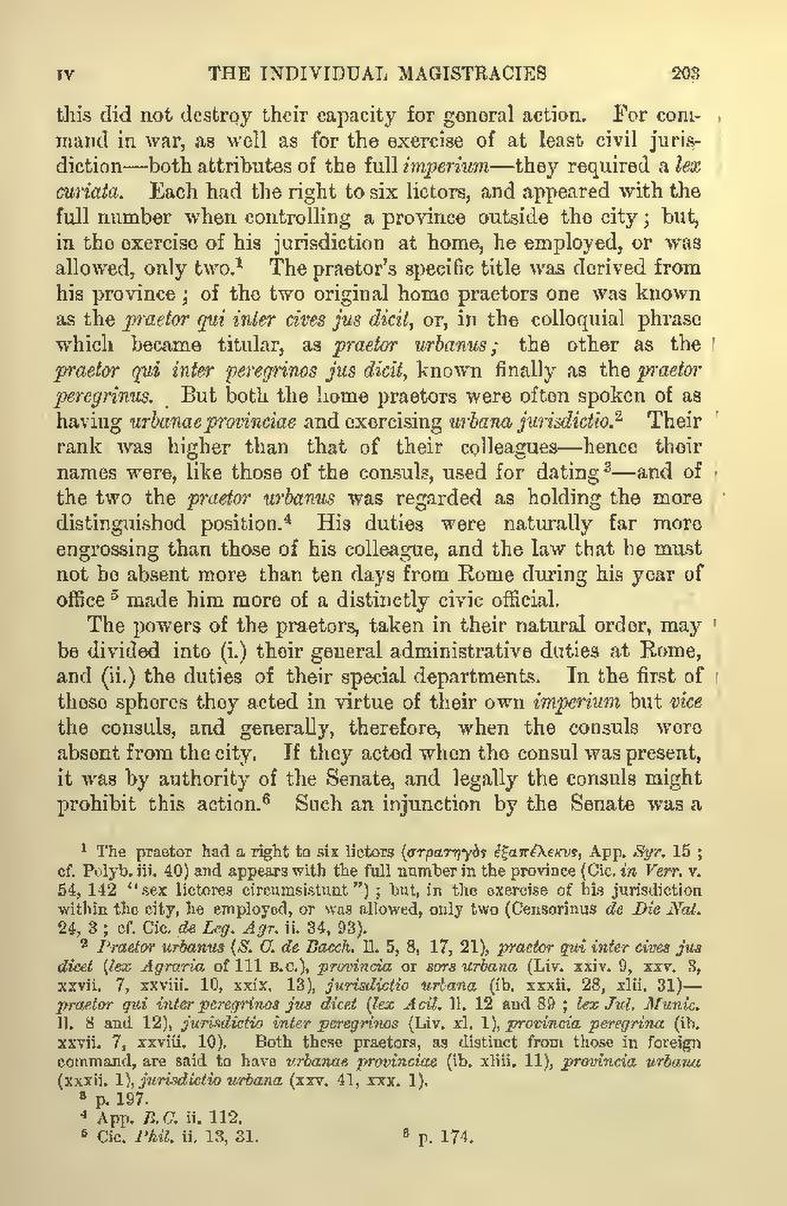this did not destroy their capacity for general action. For command in war, as well as for the exercise of at least civil jurisdiction—both attributes of the full imperium—they required a lex curiata. Each had the right to six lictors, and appeared with the full number when controlling a province outside the city; but, in the exercise of his jurisdiction at home, he employed, or was allowed, only two.[1] The praetor's specific title was derived from his province; of the two original home praetors one was known as the praetor qui inter cives jus dicit, or, in the colloquial phrase which became titular, as praetor urbanus; the other as the praetor qui inter peregrinos jus dicit, known finally as the praetor peregrinus. But both the home praetors were often spoken of as having urbanae provinciae and exercising urbana jurisdictio.[2] Their rank was higher than that of their colleagues—hence their names were, like those of the consuls, used for dating[3]—and of the two the praetor urbanus was regarded as holding the more distinguished position.[4] His duties were naturally far more engrossing than those of his colleague, and the law that he must not be absent more than ten days from Rome during his year of office[5] made him more of a distinctly civic official.
The powers of the praetors, taken in their natural order, may be divided into (i.) their general administrative duties at Rome, and (ii.) the duties of their special departments. In the first of these spheres they acted in virtue of their own imperium but vice the consuls, and generally, therefore, when the consuls were absent from the city. If they acted when the consul was present, it was by authority of the Senate, and legally the consuls might prohibit this action.[6] Such an injunction by the Senate was a, App. Syr. 15; cf. Polyb. iii. 40) and appears with the full number in the province (Cic. in Verr. v. 54, 142 "sex lictores circumsistunt"); but, in the exercise of his jurisdiction within the city, he employed, or was allowed, only two (Censorinus de Die Nat. 24, 3; cf. Cic. de Leg. Agr. ii. 34, 93).]
- ↑ The praetor had a right to six lictors ([Greek: stratêgos hexapelekys
- ↑ Praetor urbanus (S. C. de Bacch. ll. 5, 8, 17, 21), praetor qui inter cives jus dicet (lex Agraria of 111 B.C.), provincia or sors urbana (Liv. xxiv. 9, xxv. 3, xxvii. 7, xxviii. 10, xxix. 13), jurisdictio urbana (ib. xxxii. 28, xlii. 31)—praetor qui inter peregrinos jus dicet (lex Acil. ll. 12 and 89; lex Jul. Munic. ll. 8 and 12), jurisdictio inter peregrinos (Liv. xl. 1), provincia peregrina (ib. xxvii. 7, xxviii. 10). Both these praetors, as distinct from those in foreign command, are said to have urbanae provinciae (ib. xliii. 11), provincia urbana (xxxii. 1), jurisdictio urbana (xxv. 41, xxx. 1).
- ↑ p. 197.
- ↑ App. B. C. ii. 112.
- ↑ Cic. Phil. ii. 13, 31.
- ↑ p. 174.
